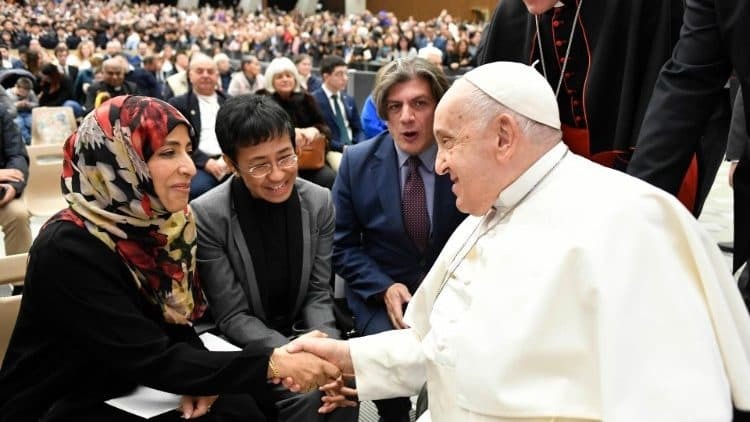In the latest episode of tension between Israel and the Vatican over the conflict in Gaza, Israel’s Embassy to the Holy See issued a protest May 11 after a Yemeni Nobel Prize winner had accused Israel of “genocide” in remarks at a papal event the night before.
Tawakkol Karman, a Yemeni journalist who became the first Arab woman to win the Nobel Peace Prize in 2011 for her coverage of the Arab Spring uprisings, spoke May 10 at a “World Meeting on Human Fraternity” sponsored by the Vatican’s Fratelli Tutti foundation, named for Pope Francis’s 2020 encyclical letter by that title.
Present during the event were Italian Cardinal Mauro Gambetti, Archpriest of St. Peter’s Basilica and president of the Fratelli Tutti foundation, and other Vatican officials. Roughly 30 Nobel Peace Prize winners took part in the event, who were received on Saturday both by Pope Francis and Italian President Sergio Mattarella.
Karman posted messages in Arabic on X, the social medial platform formerly known as Twitter, before and after her remarks at the Vatican event Friday evening, in both instances using the word “genocide” to describe Israel’s military operations on the Gaza Strip.
“What I will say in my speech today at the Human Fraternity Conference in the Vatican is that humanity is being slaughtered in Gaza, and that the massacres of ethnic cleansing and genocide committed by Israel against the Palestinian people are a stain of disgrace not only on the occupation, but also on the face of the entire international community, which did nothing to stop these massacres,” she wrote on May 11.
“I will also demand that the final statement of the summit condemn these massacres and demand an immediate ceasefire, and the delivery of the humanitarian relief it needs to the Strip,” Karman wrote.
The next day, she posted a message indicating she had followed through during the meeting.
“In my speech at the Human Fraternity Conference in the Vatican, I condemned the crimes of genocide and ethnic cleansing massacres against the Palestinians in Gaza and called for their condemnation and solidarity with the Palestinian people,” she wrote.
“I saluted the student demonstrations and sit-ins around the world in solidarity with the Palestinians and rejecting the Israeli aggression,” Karman added.
Late Saturday evening Rome time, the Israeli Embassy to the Holy See issued a statement expressing “indignation and shock” over the fact Karman was permitted to deliver such a message at the Vatican event.
“The site was contaminated by a flagrantly anti-Semitic speech,” the statement said.
“In a context in which the aim, presumably, was to speak about peace in order to create a more human world, it was permitted to present a propaganda speech full of lies,” the Israeli communique said.
“To speak of ethnic cleansing in Gaza while Israel every day permits large quantities of humanitarian aid to enter Gaza is Orwellian,” the statement said. “Moreover, we regret that such a speech was pronounced without anyone feeling the moral duty to intervene to stop this disgrace.”
“This episode is the latest sign of how much anti-Semitism and prejudice against the Jews are still alive,” it said.
The exchange over the weekend is the latest case in which Israeli officials or diplomats have objected to the way Vatican officials or senior Catholic prelates have characterized the Gaza conflict.
In February, the Israeli embassy objected when Italian Cardinal Pietro Parolin, the pope’s top diplomat, suggested that the Israeli response to Hamas attacks has not been “proportionate” and cited unconfirmed casualty figures provided by the Gaza Health Ministry.
The following day, the Israeli embassy released a statement calling Parolin’s remarks “deplorable.”
Many Israeli officials and Jewish leaders were offended in November after a Palestinian delegation visited the Vatican and reported that Pope Francis had used the word “genocide” to describe Israel’s offensive, a claim a Vatican spokesman attempted to deny but without great success.
In January, Chief Rabbi of Rome Riccardo Di Segni expressed “great disappointment” over what he described as “many steps backward” in Jewish-Catholic relations as a result of statements on the Gaza conflict both from the Vatican and from Catholic bishops in the Middle East, including the Latin Patriarch of Jerusalem and an ecumenical grouping of the Patriarchs and Heads of Churches in Jerusalem.
By Crux Staff






